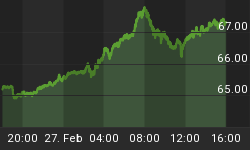What the New York Times can't even see in today's record-low bank interest rates...
LESTER BANGS getting loaded on speed, brandy and casual violence...throwing empty bottles down onto the street and assaulting a good friend's long-time partner...before reviewing Lou Reed's Metal Machine Music...
That was high-risk behavior.
Phillipe Petit walking a tight-rope between the Twin Towers of the World Trade Center...That was high-risk behavior.
Just being Simon Cowell, especially in public! That's risk-seeking behavior of the most reckless kind...
But trying to beat the rate of inflation with your savings? Does that really have to carry the same thrills and spills as putting a gun to your head and wincing in hope that the chamber is empty?
At current US bank interest rates, "If you wanted to put away enough to produce a retirement income of $50,000 a year without touching the principal, you would need $100 million on deposit," writes Floyd Norris, chief financial correspondent of the New York Times.
"To be sure, you could get a better rate with that kind of money. But not that much better."
Norris notes how, with interest rates pegged near zero, the US banking sector is literally printing money. Between Jan. and March, J.P.Morgan Chase paid just over 0.8% to raise funds. It then lent out that money at better than 4.0% on average.
"Perhaps the toll on savers should get some attention," says Norris. Yet remarkably - incredibly - he doesn't mention the true toll on cash savers in his little exposé. Not once.
Last month you needed to tie-up your money for 3 years minimum before beating inflation with a certificate of deposit (CD).
That's official inflation of 2.3% per year, by the way, rather than the 5.7% rate pegged by pre-Clinton CPI calculations, or the 9.5% rate pegged by John Williams ShadowStats' maths.
That inflation-beating lock-up also means giving your money to Aurora Bank FSB as well. Which just happens to be all that's left of Lehman Bros.
But hey - Aurora's just a bank looking for funds, and willing to pay more than anyone else (according to BankRate.com) to get them. And besides, you got to take chances in life to get the big knock-out returns, right?
| Average Real Rate of Interest on 6-month CD | Gold price change (%) | |
| 1964-1971 | 2.36% | + 7% |
| 1971-1981 | 0.14% | + 1477% |
| 1981-2002 | 3.61% | - 54% |
| 2002-2010 | 0.35% | + 312% |
"At some point in the future, we're going to need to begin to adjust the language, to begin to see changes in the substance of the policy," said one Federal Reserve policy-maker this week.
Meantime, however, the current Fed language - "exceptionally low for an extended period" - condemns cash-savers to sub-zero returns, even with inflation at barely half its 45-year average on the official CPI measure.
"I'm comfortable with interest rates where they are now," agreed another Fed chief, also on Thursday. "Everything depends on economic performance," said a third, confirming what chairman Ben Bernanke said in his congressional testimony on Wednesday.
What does that mean for savers? The longer that interest rates stay below the pace of inflation, the more risk you'll be forced to take to defend what savings you've got. Cash, after all, is only for shopping and spending....not holding its value as a store of wealth. Or at least, that's how zero-rates make it seem. Which I guess is the point of the Fed's anti-deflation policy.
So out in the zero-crazed world of trying to scrape an income, "Investors go exotic for esoteric asset-backed yields," reports EuroMoney. Institutional investors are piling into securitized debt backed by rental-car fleets, transportation, mobile phones, aircraft, shipping containers, copyright and other intellectual property, time-share mortgages and casualty insurance. Because "Investors can earn higher yields for these assets because they're less liquid and require extra due diligence," says the magazine.
"Though here, too, spreads have narrowed, investors can pocket 100 to 150 basis points more, on average, than they would buying plain-vanilla consumer asset-backed securities."
And over in Tokyo, where rates have been pegged at zero - again, "dependent on the economy" - for almost 10 years, "Japanese go wild for Brazil" reports the Financial Times. Long-time Japan watchers will wince to recall what happened when Mr. and Mrs Watanabe last bought South American bonds...just in time for the Argentine default of 2002.
But sub-zero returns paid to cash make you do weird and dangerous things with your money. Like forgetting how bad things turned out the last time that sub-zero rates forced you - and your pension fund manager - into high-risk behavior.















